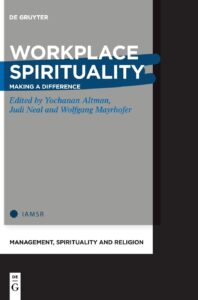Laszlo Zsolnai’s paper on “Ethics and Spirituality” was published in Yochanan Altman, Judi Neal and Wolfgang Mayrhofer (Eds.): Workplace Spirituality. Making a Difference (2022, De Gruyter, pp. 75–83).

The paper explores the relationship between ethics and spirituality in the business and management context. It shows that business ethics lacks a deeper existential-spiritual foundation which leads to the inadequate and ineffective functioning of ethics in business and management. The paper argues for spiritual-based business ethics and presents some research tracks (namely, Integral Ecology, the Indian Ethos in Management, and Buddhist Economics) which create meaningful connections between ethics and spirituality. Finally, the paper discusses the challenges of the Anthropocene era for ethics and spirituality in business and management and details the corresponding tasks for research and action.
Integral Ecology, proposed by Pope Francis integrates the concerns for people and the planet. An integral and transdisciplinary understanding of the world links up science to human values and sees the world as a systemically connected ecology, economy, equity and justice. Integral ecology shows a path to sustainable development through frugal consumption and the acknowledgement of the intrinsic value of nature.
Indian Ethos in Management is a movement initiated by S.K. Chakraborty, the founder of Management Centre for Human Values at the Indian Institute of Management, Calcutta. It aims to bring India’s indigenous concepts into the professional management.
Buddhist Economics represents an alternative economic mindset that challenges the underlying assumptions of Western economics. While Western economics promotes doing business based on individual, self-interested, profit-maximizing ways, Buddhist economics suggests to minimize suffering of all sentient beings.